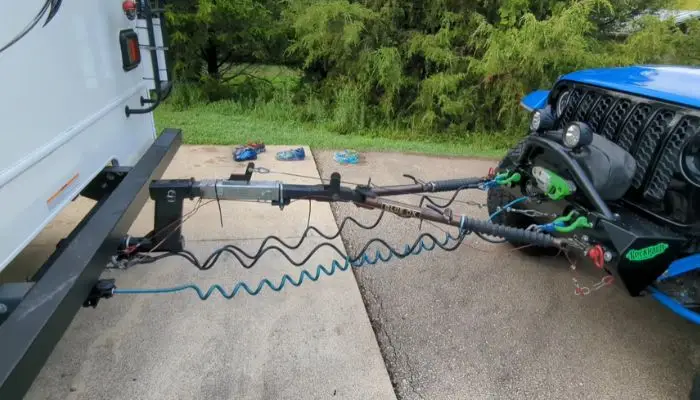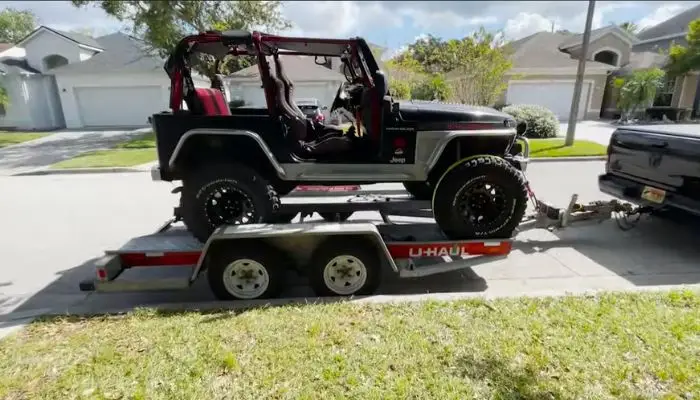Towing a Jeep does put miles on it, as the wheels of the Jeep will be moving during the towing process. Towing a Jeep can be a convenient solution for transporting it from one place to another.
Whether you need to move it for repairs or take it on a cross-country trip, towing allows you to transport your Jeep efficiently. However, many Jeep owners wonder if towing their vehicle will add mileage to its odometer. The answer is straightforward: towing a Jeep indeed puts miles on it as the wheels of the vehicle will be rotating during the towing process.
This means that even though the Jeep’s engine may not be running, the tires will still be in motion, causing the odometer to accumulate mileage. Understanding the implications of towing on the mileage of your Jeep is essential to make informed decisions and properly maintain your vehicle.

Impact Of Towing On Mileage
When it comes to towing a Jeep, one common concern is whether it adds mileage to the vehicle’s odometer. Understanding the impact of towing on mileage is crucial for Jeep owners to make informed decisions about their vehicle usage. Here, we will explore the mechanics of towing, factors that influence mileage count, and provide insights into the impact of towing on Jeep mileage.
Mechanics Of Towing
When a Jeep is being towed, the wheels and drivetrain continue to spin, causing the odometer to accumulate mileage. Even though the engine is not providing power, the rotation of the wheels still registers as distance traveled. This means that towing a Jeep does indeed contribute to the overall mileage recorded on the odometer.
Factors Influencing Mileage Count
The type of towing method employed can influence the amount of mileage added to the Jeep. For instance, flat towing (also known as dinghy towing) with all four wheels on the ground will likely result in higher mileage accumulation compared to using a trailer or dolly where only two wheels are in motion.
Additionally, the speed at which the Jeep is being towed can impact mileage count, with higher speeds leading to more significant mileage increase.
Different Types Of Towing
Towing a Jeep can be a convenient way to transport it from one location to another. However, when it comes to towing, there are different methods you can use depending on your specific needs and circumstances.
Understanding the different types of towing can help you make an informed decision and ensure the safety of your Jeep. In this section, we will explore two common types of towing: flat towing and towing on a trailer.

Flat Towing
Flat towing, also known as dinghy towing, is a popular method used to tow vehicles, including Jeeps. This method involves attaching the Jeep directly to the towing vehicle, allowing all four wheels of the Jeep to remain on the ground.
Flat towing is a preferred choice for many Jeep owners as it does not require a trailer, making it a more cost-effective and convenient option. It is important to note that flat towing a Jeep does put miles on it as the Jeep’s wheels are in motion during the towing process. However, these miles are minimal compared to driving the Jeep for long distances.
When flat towing a Jeep, it is crucial to use the correct equipment and follow proper procedures to prevent any damage to the vehicle. You will need a tow bar, which attaches the Jeep to the towing vehicle. The tow bar should be securely connected, ensuring that it can handle the weight of the Jeep.
Additionally, safety chains and supplemental brakes may be necessary to ensure safe and controlled towing. Before flat towing your Jeep, it is recommended to consult the vehicle’s owner’s manual or seek professional advice to ensure you are following the manufacturer’s guidelines.
Also Read: Can You Flat Tow a Jeep Gladiator

Towing On A Trailer
Towing a Jeep on a trailer is another popular method that provides added protection and stability during transportation. With this method, the Jeep is loaded onto a trailer, which is then connected to the towing vehicle.
Towing on a trailer eliminates the need for the Jeep’s wheels to be in motion during transportation, thus preventing any wear and tear on the vehicle. This can be beneficial if you are concerned about putting unnecessary mileage on your Jeep.
Using a trailer to tow a Jeep offers additional perks, such as the ability to transport other cargo along with the vehicle. Trailers come in various sizes, allowing you to choose one that suits your needs.
It is important to ensure that the trailer you use is compatible with your Jeep’s weight and dimensions and that it is securely attached to prevent any accidents or damage during transportation.
Jeep-specific Considerations
When it comes to towing a Jeep, there are several Jeep-specific considerations that need to be taken into account. One of the most important factors to consider is the specific Jeep model and year. Different Jeep models and years may have varying towing capacities, so it’s crucial to understand the limitations of your particular vehicle before towing.
Jeep Model And Year
Your Jeep’s model and year plays a significant role in determining its towing capabilities. The towing capacity differs between Jeep models due to variations in engine power, suspension, and other factors. This means that while one Jeep model may be able to tow a certain amount of weight, another model may have a lower towing capacity.
Therefore, it’s recommended to first determine your Jeep’s model and year to ensure you have accurate information about its towing capabilities.
Towing Guidelines From Manufacturer
Manufacturers provide specific guidelines regarding towing capacities for each Jeep model and year. These guidelines are designed to ensure the safety and longevity of your vehicle. It’s essential to review the owner’s manual or contact the manufacturer directly to obtain the most accurate and up-to-date information about towing your Jeep.
Following these guidelines will help prevent any potential damage to your vehicle or exceeding its towing capacity.
Remember that towing a Jeep puts additional stress on the vehicle’s engine, transmission, and other components. Exceeding the recommended towing capacity can lead to overheating, increased wear and tear, and even engine damage. So, always stay within the guidelines set by the manufacturer to keep your Jeep in optimal condition.
Effects Of Towing On Wear And Tear
Towing a Jeep is a common practice for many Jeep owners, especially when it comes to transporting it to off-road trails or when moving to a new location. However, many people wonder whether towing a Jeep actually puts miles on it. Let’s explore the effects of towing on wear and tear to better understand the impact.
Engine Wear
Towing a Jeep can put additional strain on the engine, which may lead to increased wear and tear. The engine is responsible for providing the necessary power to move both the Jeep and the towing vehicle.
When towing, the engine has to work harder, especially when traversing inclines or rough terrain. This can result in accelerated wear on components such as the pistons, rings, and bearings.
Suspension And Tire Wear
When towing a Jeep, the suspension undergoes increased stress due to the additional weight. This can lead to premature wear on components such as the shock absorbers, springs, and bushings.
Furthermore, the tires are subjected to increased friction and heat, which can accelerate tread wear and reduce their lifespan.
Strategies To Minimize Mileage Impact
To minimize mileage impact when towing a Jeep, consider using a trailer or flat towing method. This can help prevent unnecessary wear and tear on the vehicle. Regular maintenance and using proper towing equipment are key to preserving the Jeep’s longevity.
Proper Towing Equipment
Using appropriate towing gear helps prevent added wear on your Jeep.
Regular Vehicle Maintenance
Maintaining your Jeep regularly ensures its optimal performance during towing.

Wrapping Up
Towing a Jeep does put miles on it, and it can impact the vehicle’s overall wear and tear. It’s important to consider the implications of towing on the Jeep’s mileage and maintenance needs. By understanding the potential effects, you can make informed decisions when it comes to towing your Jeep.
FAQs
Does flat towing a Jeep add miles to the odometer?
No, flat towing a Jeep Wrangler (or other towable Jeeps) in the proper configuration will not add miles to the odometer. The odometer is electronic and requires the engine and ignition to be on to register mileage.
Why is it important to follow the manufacturer’s instructions for towing my Jeep?
The manufacturer’s instructions specifically outline the steps to put your Jeep’s transfer case into neutral. Incorrect procedure could damage the transmission and other drivetrain components, even if miles aren’t added. Always refer to your owner’s manual for the exact process.
Do any Jeeps add miles when towed?
It’s extremely unlikely for modern Jeeps. However, there are a few things to consider:
- Older Jeeps may have mechanically driven odometers linked to the transmission.
- Leaving the key in the ignition, even in the ‘off’ position, on some models might keep the electronics active, potentially registering miles.
If miles aren’t added, does towing my Jeep have any wear and tear?
Yes, while the engine isn’t running, there’s still wear and tear on components like:
- Tires
- Wheel bearings
- Suspension components
- Steering linkages It’s a good idea to track the miles towed for maintenance purposes.
Are there any resources to confirm if my specific Jeep model adds miles when towed?
Yes! Here are a few places to check:
- Your Jeep’s owner’s manual (most reliable source)
- Jeep enthusiast forums with model-specific discussions (https://www.jlwranglerforums.com/ , https://www.wranglerforum.com/)
- Reputable RV forums where towing vehicles is a common topic.

